United CEO Tackles a Wide Range of Topics in Telephone Town Hall
by
UNITED COOPERATIVE SERVICES
Don’t worry, members. Your internet is coming.
That was one of three points discussed by United’s CEO Cameron Smallwood during a Sept. 26 Telephone Town Hall. He also discussed how economic conditions had created the need for an upcoming rate adjustment and updated members on United’s facilities.
About 3,360 members attended the event by telephone and online.
More than 27,000 subscribers are connected to United’s high-speed internet service, Smallwood said. He reminded attendees that the original five-year plan to complete the project was thwarted after wireless internet service intended to serve portions of the western half of the service territory proved unreliable. The co-op decided to provide fiber-to-the-home to areas originally slated for wireless, which increased expenditures from $200 million to about $380 million and extended the completion process to eight years.
To meet this goal, the co-op created a plan to build out to unserved areas and to apply for federal grant money to help defray costs and provide high-speed internet service to non-member areas that are close to United’s internet infrastructure.
“We spent the last several months putting the schedule together for the remainder of the project,” Smallwood said. “Starting Oct. 1, you can call your local United office and give us your address, and we will tell you where you are in the schedule.
“With that said, the more registrations we have per cost of building an area, the sooner it can affect when that area gets constructed. We really need you to register.”
United’s rates have stayed historically lower than the REP average for the past five years thanks in part to the agreement United made with Constellation Energy, which began in 2023 following the Brazos Bankruptcy.
“Ever since we started our Constellation contract, our rates have been stable,” he said. “It’s pretty much stayed the same. There’s been a lot of volatility in the ERCOT market, and we’ve been able to mitigate that for you through this contract. It’s provided stability, and it’s provided some time to prepare for the future and to work on a plan beyond 2025.”
 Smallwood said 80 percent of a member’s bill goes to pay wholesale costs for the power supply component of the bill. That cost is passed onto United members with no mark-up from the co-op. The other 20 percent goes to pay for the infrastructure and resources it takes to distribute the electricity to United members.
Smallwood said 80 percent of a member’s bill goes to pay wholesale costs for the power supply component of the bill. That cost is passed onto United members with no mark-up from the co-op. The other 20 percent goes to pay for the infrastructure and resources it takes to distribute the electricity to United members.
The current economic climate has triggered United to instill a rate adjustment to keep up with skyrocketing costs, he said. Interest rates on both long- and short-term loans have also jumped considerably. Using a pad mount transformer as only one example, prices for this key piece of equipment have increased a whopping 238 percent since 2019, he said.
To arrive at the appropriate rate adjustment, the co-op, with guidance from a rate consultant, performed a cost-of-service study and created a Membership Advisory Committee with members from all seven districts of the service territory, he said. This committee agreed with the need to adjust rates on the co-op’s portion of the bill, and after considering several options, they chose the plan of action recommended by United’s staff as the fairest to members. The overall adjustment across all rate classes is 6.9 percent starting on the December bill. For residents who use about 1,500 kilowatt hours, their bill will increase by about $14 per month.
“I don’t enjoy doing a rate increase,” he said. “Our staff doesn’t. Our board doesn’t. We know that our members don’t like that, and I understand that completely. We only do this when we have to, and we absolutely have to at this point.”
Smallwood also gave an update on facilities and explained that with the addition of high-speed internet service, the co-op needs space to house the growing employee group. The Cleburne reconstruction project will be large enough to hold more employees than the old facility when completed in 2025. The co-op was able to save several million dollars by holding onto the land it possessed in Cleburne and tearing the old facility down.
The recently completed Mansfield office most likely will not cost members anything, Smallwood said. The co-op purchased 60 acres of land in Mansfield in the 1990s, Smallwood said, and it used only 10 acres for the new facility. Once the remaining land is sold, it should cover the cost of that facility.
Members interested in hearing the entirety of the Telephone Town Hall event can do so by visiting www.ucs.net/news-and-information.


